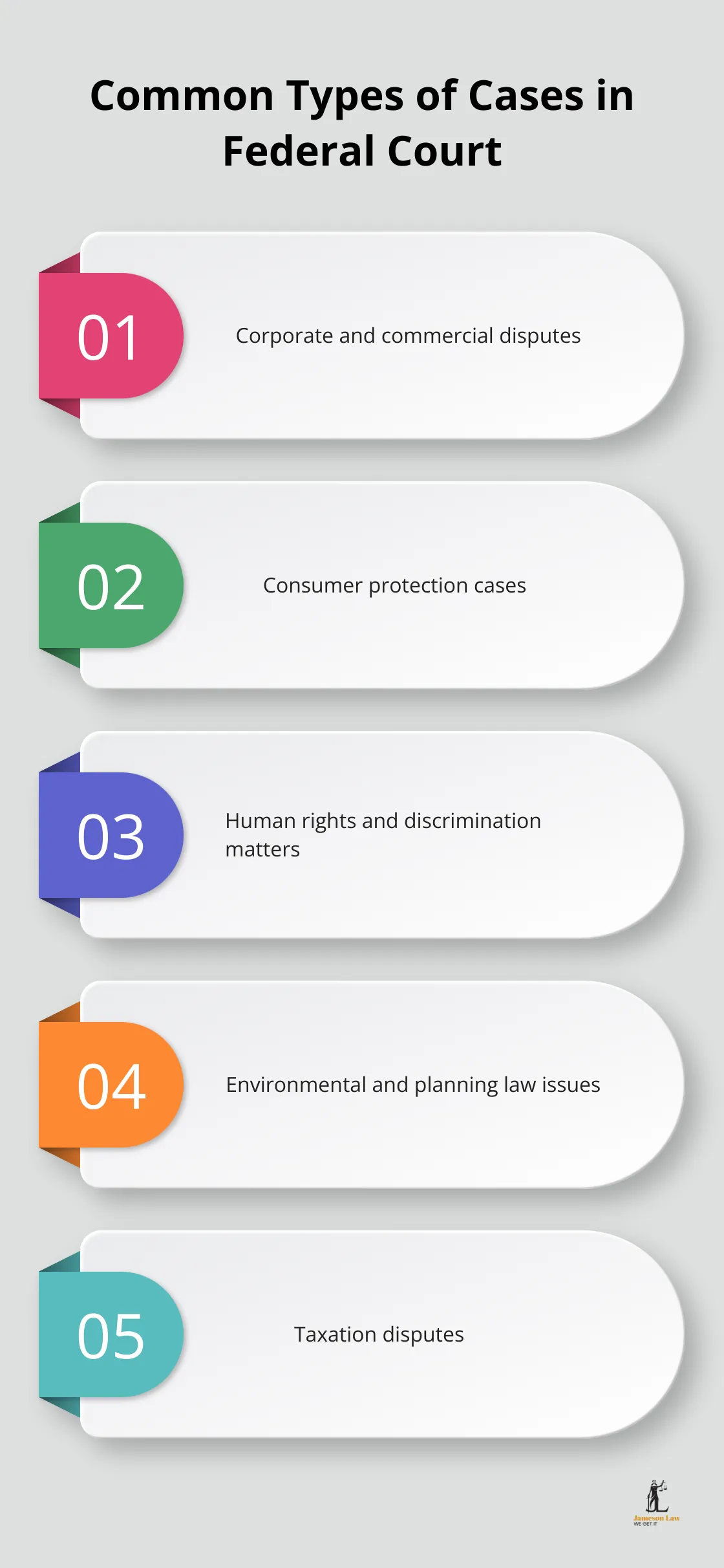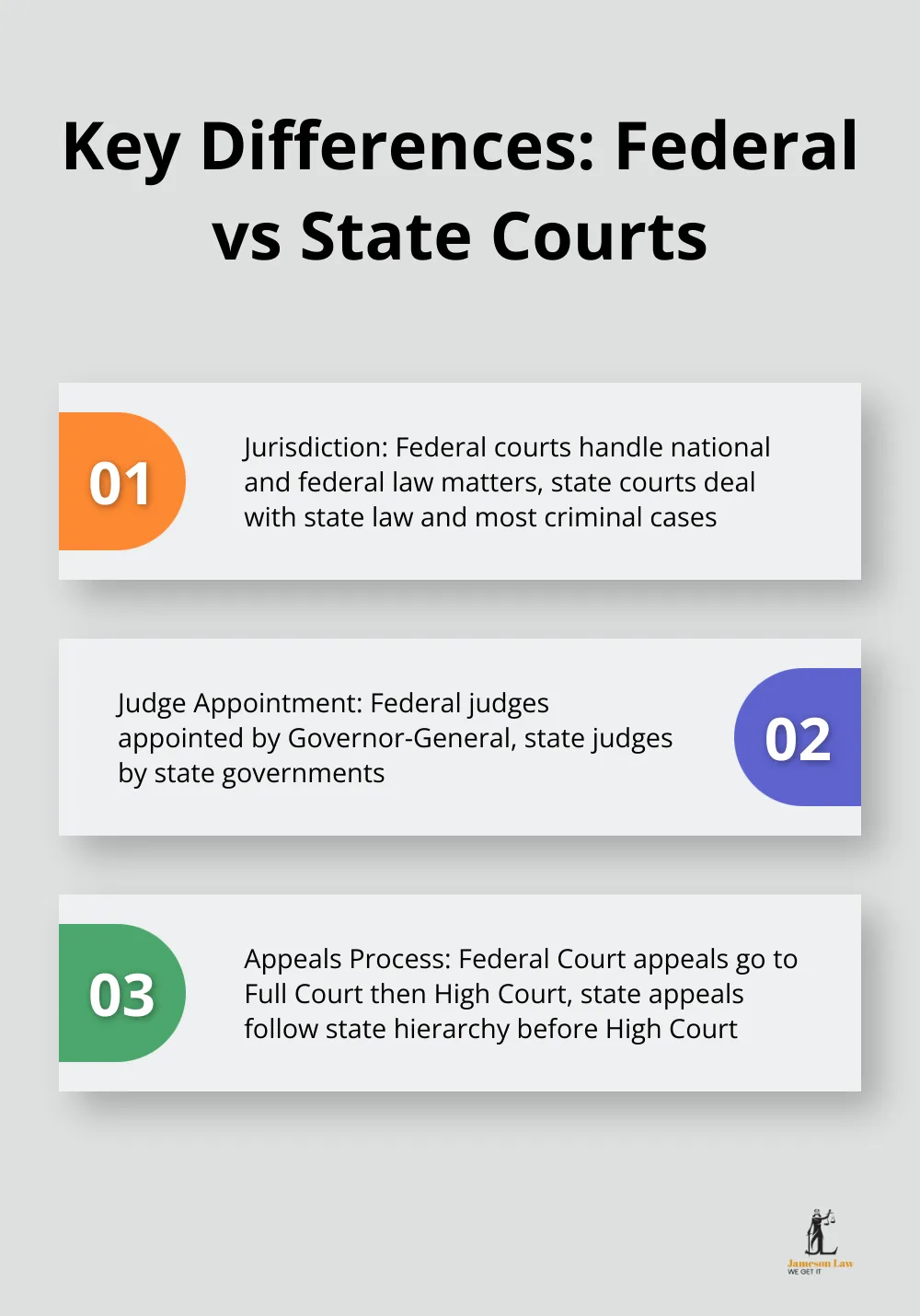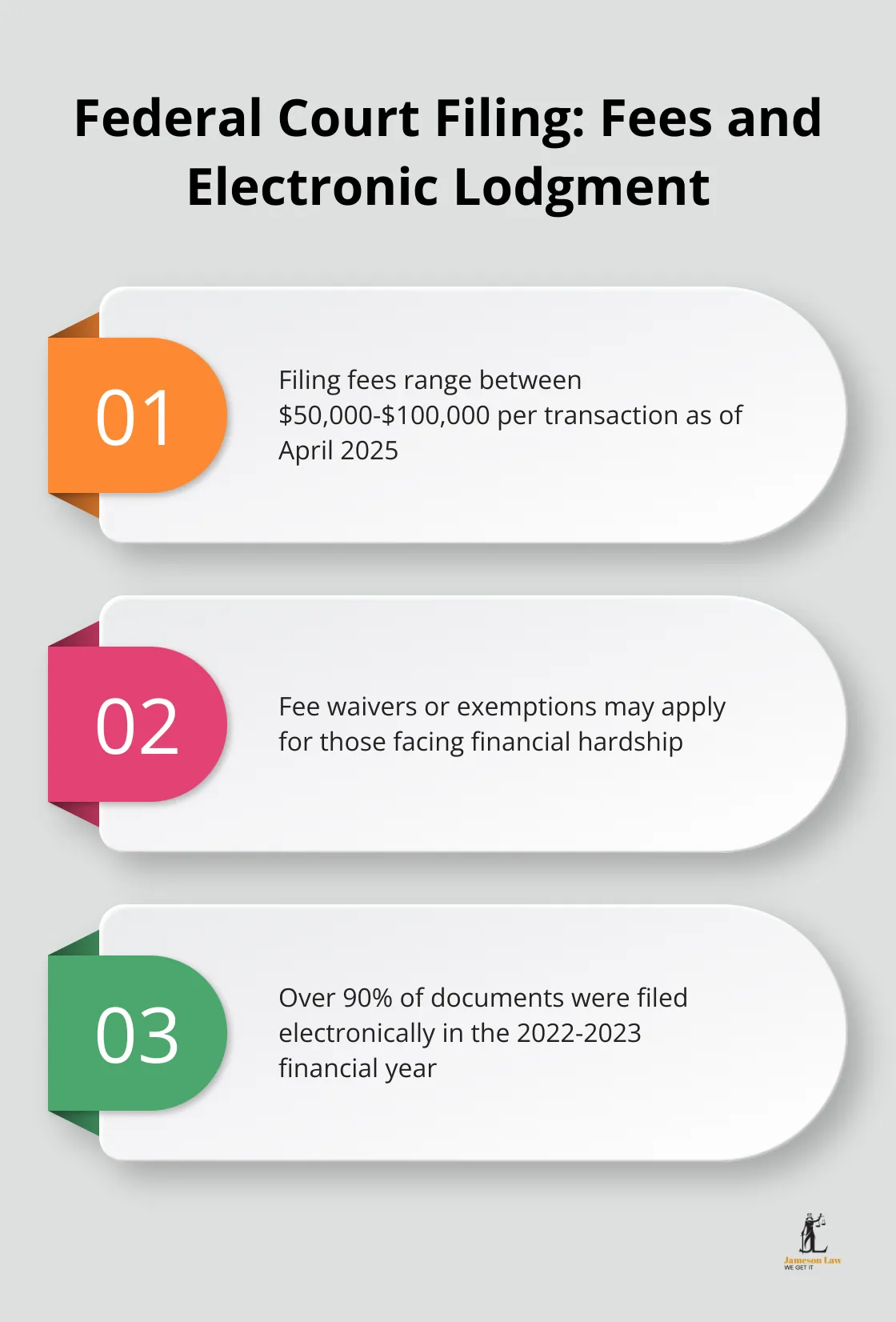The Federal Court of Australia plays a pivotal role in our nation’s legal system. From complex commercial disputes to constitutional challenges, this court handles a wide array of cases that shape Australian law and society.
At Jameson Law, we understand the importance of navigating the Federal Court process effectively. This guide will walk you through the court’s structure, jurisdiction, and key procedures, helping you grasp its significance in upholding justice across the country.
How Does the Federal Court Operate in Australia?
The Federal Court’s Unique Role
The Federal Court of Australia stands as a cornerstone of our nation’s legal system, wielding significant power and influence across a broad spectrum of legal matters. Since 1997, this court has been a court of general federal civil jurisdiction, having jurisdiction whenever a law of the Commonwealth Parliament confers jurisdiction on it.
Unlike state courts, the Federal Court has jurisdiction over matters arising under Commonwealth law. This includes areas such as bankruptcy, corporations law, industrial relations, and intellectual property. The court’s decisions can have far-reaching consequences, often setting precedents that shape the interpretation and application of laws across Australia.
The landmark case of Mabo v Queensland (No 2) [1992] exemplifies the court’s impact. This decision was a significant development towards the recognition of traditional Aboriginal and Torres Strait Islander land rights under Australia’s legal system.
Types of Cases Heard
The Federal Court hears an extensive range of cases, reflecting the complexity of modern legal challenges. Some of the most common types include:

Class action filings rebounded in 2023, making it the second biggest year for filings of all time. While consumer claims continue to dominate, claims from other areas are also significant.
Federal vs State Courts: Key Differences
While both federal and state courts play crucial roles in Australia’s legal system, they differ in several key aspects:
- Jurisdiction: Federal courts deal with matters of national significance or those involving federal law, while state courts handle cases under state law and most criminal matters.
- Appointment of judges: The Governor-General appoints Federal Court judges on the advice of the federal government, whereas state governments appoint state court judges.
- Appeals process: Appeals from the Federal Court typically go to the Full Court of the Federal Court and then potentially to the High Court of Australia. State court appeals usually progress through the state court hierarchy before reaching the High Court.
Understanding these distinctions proves essential for anyone navigating the Australian legal system. Many legal professionals (including those at Jameson Law) assist clients in determining the appropriate jurisdiction for their legal matters, ensuring they receive the most effective representation possible.

The Impact of Federal Court Decisions
Federal Court rulings often have significant implications beyond the immediate case at hand. For instance, the court’s decision in ACCC v Google LLC [2021] held Google accountable for misleading consumers about the collection of personal location data, setting a precedent for data privacy cases across Australia.
Such decisions underscore the Federal Court’s role in shaping corporate behaviour, protecting consumer rights, and interpreting complex areas of law. Legal practitioners closely monitor these developments to provide their clients with up-to-date advice and strategies.
As we move forward, it’s important to understand how cases progress through the Federal Court system. The next section will outline the key stages of Federal Court proceedings and explain how cases are initiated in this important legal forum.
How Does the Federal Court Process Work?
Initiating a Case in the Federal Court
The Federal Court process starts with the filing of an originating application or statement of claim. This document outlines the dispute and the relief sought. There are currently 146 current first instance Representative Proceedings in the Court nationally.
Filing fees vary based on the case type and applicant’s circumstances. As of April 2025, filing fees are likely to be between $50,000-$100,000 per transaction, with exemptions for some cases. (Fee waivers or exemptions may apply for those facing financial hardship.)
The Federal Court’s eLodgment system has modernised the filing process. Over 90% of documents were filed electronically in the 2022-2023 financial year, showcasing the court’s commitment to technological efficiency.

Key Stages of Federal Court Proceedings
Once initiated, a case progresses through several stages:
- Case Management: A judge oversees the case’s progress, issuing directions about evidence, timelines, and procedural matters.
- Discovery: Parties exchange relevant documents and information. Complex cases may involve millions of documents.
- Mediation: The court often requires parties to attempt mediation before trial.
- Trial: If mediation fails, the case proceeds to trial. A single judge typically hears trials in the Federal Court without a jury.
- Judgment and Appeals: After the trial, the judge delivers a judgment. Dissatisfied parties may seek leave to appeal to the Full Court of the Federal Court.
The duration of these stages varies significantly. Straightforward matters might resolve in months, while complex cases can take years. The high-profile ASIC v Westpac Banking Corporation case, which addressed responsible lending obligations, took over three years from filing to final judgment.
Alternative Dispute Resolution Options
The Federal Court promotes alternative dispute resolution (ADR) methods to resolve cases without a full trial. These options include:
- Mediation: A neutral third party facilitates negotiations between parties.
- Arbitration: An independent arbitrator makes a binding decision after hearing both sides. This option is less common in Federal Court matters but can prove useful in certain commercial disputes.
- Early Neutral Evaluation: An experienced lawyer or retired judge provides a non-binding assessment of the case’s merits, often leading to settlement discussions.
- Case Appraisal: Similar to early neutral evaluation, but more detailed and typically used in complex matters.
These ADR options can significantly reduce costs and time compared to a full trial. A successful mediation can save parties hundreds of thousands of dollars in legal fees and months or even years of litigation.
The Federal Court process, while complex, provides a structured approach to resolving disputes efficiently and fairly. As we move forward, we will explore significant Federal Court cases and their impact on Australian law and society.
How Federal Court Rulings Shape Australian Law
Landmark Decisions and Their Impact
The Federal Court of Australia plays a pivotal role in shaping our nation’s legal landscape through landmark decisions with far-reaching implications. These rulings resolve individual disputes and set precedents that influence future cases and often lead to legislative changes.
One of the most significant Federal Court rulings in recent years was the 2022 decision in ACCC v Google LLC. The court ordered Google to pay $60 million in penalties for making misleading representations to consumers about the collection and use of their personal data. This judgment set a new standard for data privacy and consumer protection in the digital age, forcing tech giants to be more transparent about their data collection practices.
In the realm of employment law, the case of Workpac v Rossato provided greater clarity for employers around the concept of when an employee will be deemed “casual” and how to prove and disprove a “firm advance commitment”. This decision prompted swift legislative action, with the government amending the Fair Work Act to provide greater clarity on casual employment.
Judicial Interpretation Shapes Legislation
Federal Court rulings often highlight gaps or ambiguities in existing legislation, which prompts parliamentary action. The 2020 decision in Mondelez v AMWU, which dealt with the calculation of personal leave entitlements, led to significant debate and ultimately resulted in the High Court overturning the Federal Court’s interpretation. This case underscored the complex interplay between judicial decisions and legislative intent.
In environmental law, the Sharma v Minister for the Environment case initially succeeded at trial but was overturned on appeal. This groundbreaking litigation examined the duty of care for climate change in Australia, sparking intense debate about climate change litigation and governmental responsibilities.
Recent High-Profile Cases and Outcomes
The ongoing class action against Robodebt (initiated in 2019) has been one of the most closely watched Federal Court cases in recent years. This case challenged the legality of the government’s automated debt recovery system and resulted in a $1.8 billion settlement in 2020. The court’s management of this complex litigation highlighted the effectiveness of the class action mechanism in addressing large-scale governmental errors.
In the corporate sphere, the Federal Court’s 2022 decision in ASIC v RI Advice Group Pty Ltd marked the first time a company breached its license obligations by failing to adequately manage cybersecurity risks. This ruling set a new benchmark for corporate cybersecurity obligations and will likely influence future regulatory approaches.
The Federal Court’s role in shaping Australian law continues to evolve, with each significant ruling potentially altering the legal landscape. As we navigate increasingly complex legal challenges, the court’s decisions will undoubtedly continue to have profound impacts on legislation, corporate behaviour, and individual rights.
Final Thoughts
The Federal Court of Australia shapes our legal system, influencing legislation, corporate behavior, and individual rights. It faces new challenges in an increasingly complex landscape, including climate change litigation, data privacy concerns, and artificial intelligence regulation. The court must balance legal certainty with flexibility to address novel issues while embracing technological advancements to improve efficiency and access to justice.
Expert legal guidance can make a significant difference when navigating the Federal Court system. Jameson Law offers comprehensive support for Federal Court matters across various practice areas. Our team provides tailored, effective representation for complex commercial disputes, personal injury claims, and other Federal Court proceedings.
The Federal Court will remain vital in upholding Australian law, protecting rights, and shaping our legal framework. Skilled legal representation allows individuals and businesses to navigate the Federal Court system with confidence. This institution will continue to evolve and adapt, ensuring justice and contributing to the ongoing development of Australian law.













